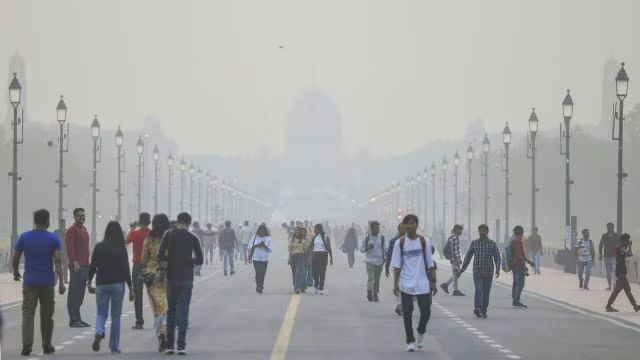The Supreme Court expected at least one NCR state to demonstrate that it had paid allowances to workers after construction was halted.
New Delhi: The Supreme Court has strongly criticized Delhi and other states in the National Capital Region (NCR) for failing to provide allowances to laborers after construction activities were halted due to air pollution. The court stated that it has observed that progress only happens when top officials are summoned.
“We find that none of the NCR states have complied with our directive to pay compensation to construction workers. Not even a single proof of payment has been presented. We order the Chief Secretaries to attend a video conference. Once they come, they will take this seriously. We want evidence of payment,” stated the bench comprising Justice AS Oka and Justice AG Masih. “In our experience, things only start moving when we issue a summons.
” The court had anticipated that at least one of the states would demonstrate that they had paid allowances to a significant number of workers. The Chief Secretaries of Delhi, Haryana, Uttar Pradesh, and Rajasthan have been instructed to appear on Thursday.
The court declined to lift the restrictions imposed under Stage 4 of the Graded Response Action Plan (GRAP) to address the worsening Air Quality Index (AQI), which had reached the ‘severe +’ category but has recently dropped to ‘very poor.’ The bench stated it would consider further relaxations only if there is a downward trend in the AQI.
Additionally, the court expressed concern over “very shocking revelations” from reports by court commissioners tasked with monitoring the enforcement of restrictions in the NCR. The court noted, “There is a complete lack of coordination between the Delhi government, the Municipal Corporation of Delhi (MCD), the Delhi Pollution Control Committee (DPCC), the Commission for Air Quality Management (CAQM), and other authorities.”
In a prior statement, a lawyer highlighted that court commissioners are facing intimidation. “We feel very unsafe. Local toll personnel and the Station House Officer informed me that this area is associated with criminals and gangs who are very active,” said an advocate serving as a court commissioner.
The court commended the efforts of the court commissioners and acknowledged that they have risked their lives while performing their duties. It also directed the Delhi Police to submit a report detailing the actions taken in response to these threats.
Furthermore, the court noted that the commissioners could request armed protection from the Delhi Police, stating, “It is the responsibility of the Delhi Police to ensure that court commissioners are adequately protected.”
The Centre’s counsel, Additional Solicitor General Aishwarya Bhati, argued that the GRAP restrictions are “extremely disruptive.” However, the court countered, “Without a clear downward trend in the AQI, how can we relax the restrictions?”
At one point, the bench reprimanded a lawyer who mentioned that no masks were being distributed, saying, “Do you expect us to run the government? There has to be some limit. If you want us to focus solely on this matter, we can arrange that.”
The court did allow the Delhi government to proceed with repairing severely damaged sewage lines and roads but clarified that no vehicles should be used for this purpose that are not in accordance with the law.
Delhi’s air quality showed a slight improvement for the second consecutive day on Monday, although it still remained in the ‘poor’ category, with an Air Quality Index (AQI) of 273 in the morning. According to the Central Pollution Control Board (CPCB), the city’s 24-hour average AQI on Sunday was recorded at 285, marking a shift to the ‘poor’ category. This improvement brings some relief after 32 consecutive days of ‘very poor’ and ‘severe’ air quality, where the AQI exceeded 400.
The last time the air quality was categorized as ‘poor’ was on October 29, with an AQI of 268, as reported by the CPCB. Experts attribute this improvement to dry northwesterly winds and ample sunlight, which have helped disperse pollutants. However, the air quality remains concerning, as an AQI between 201 and 300 is still considered harmful to sensitive groups.
To clarify the AQI categories: an index of 0-50 is regarded as ‘good’, 51-100 as ‘satisfactory’, 101-200 as ‘moderate’, 201-300 as ‘poor’, 301-400 as ‘very poor’, and 401-500 as ‘severe’.
The India Meteorological Department (IMD) reported a minimum temperature of 10.4 degrees Celsius on Monday, which is 0.9 degrees above the season’s average. The maximum temperature is expected to rise to around 27 degrees Celsius, with humidity levels recorded at 89 percent at 8:30 AM, according to the IMD.-PTI
Also Read- stampede that occurred after clashes during a football match in Guinea.
Reference- Delhi SC Court, Delhi air pollution case

